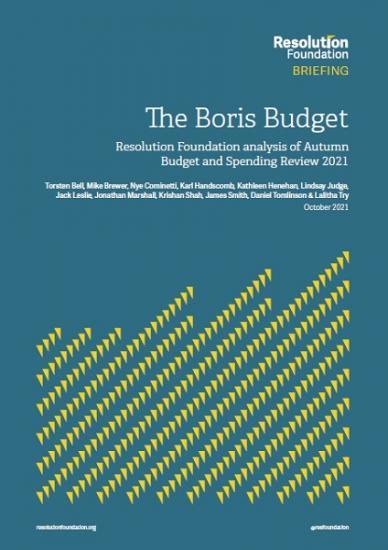The Boris Budget Resolution Foundation Analysis Of Autumn Budget And Spending Review 2021
30th October 2021

This briefing note provides an assessment of the measures announced in the October 2021 Budget and Spending Review. The Chancellor has unveiled a career-defining third Budget against a backdrop of heightened uncertainty and risks. His aim: to draw a line under Covid-19, boost spending in the key priority areas yet also bear down on the deficit and cement a reputation as a Chancellor of sound money. Supply-chain disruptions, sharply rising Covid-19 cases, spiking inflation and signs that the recovery is faltering provided a worrying backdrop. But in the event, good news on the economic outlook has made life easier for the Chancellor: stronger growth and inflation mean that he could fund giveaways while also meeting his fiscal rules with headroom to spare.
Real wages are set to fall again next year, while the medium-term outlook for steady state real wage growth at the end of the forecast period is just 1.5 per cent (down from 2.5 per cent in 2010). This is particularly troubling, given the UK is still in the midst of its weakest decade for pay growth since the 1930s.
A major upgrade to growth and the public finances gave the Chancellor a £141 billion lower cumulative borrowing windfall (from 2022-23 to 2025-26), half of which he used to raise public service spending and soften the cost of living crunch for low-income working families. The increased spending is frontloaded, with 63 per cent of the borrowing windfall spent next year before falling to 24 per cent in 2025-26. As a result, spending as a share of the economy is set to hit its highest level outside recessions since the early 1980s by the middle of the decade.
A staggering £84 billion of the £111 billion a year increase in day-to-day Whitehall-controlled departmental spending since 2009-10 will have gone to the Department of Health and Social Care by 2024-25. By contrast, only one-third of the cuts to real day-to-day spending per-capita in unprotected departments since 2009-10 will have been reversed by the middle of the decade. Real day-to-day spending in Work and Pensions and Transport will be down 62 per cent and 32 per cent respectively on 2009-10 levels.
The Budget is pushing the UK to being a higher tax economy. In 2026-27, tax as a share of the economy will be at its highest level since 1950, amounting to an increase per household since Boris Johnson became Prime Minister of £3,000.
The combined impact of polices announced by the Chancellor - including on Universal Credit, reduced Alcohol and Fuel Duties and higher Council Tax, Income Tax and National Insurance - will deliver a 2.8 per cent income boost to the poorest fifth of households by the middle of the decade, but an income hit of 2 per cent to middle-income households, and a 3.1 per cent hit to the richest fifth of households.
The reduction in the taper rate in Universal Credit will bring an additional 400,000 families into the benefits system next year. Around 75 per cent of the 4.4 million households on Universal Credit will be worse off as a result of decisions to take away the £20 per week uplift despite the Chancellor's new Universal Credit measures in the Budget.
Read the full report HERE
Pdf 45 pages
